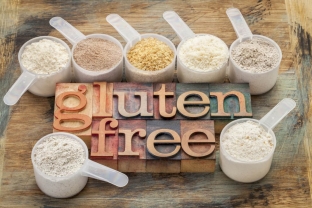Gluten (or gluten) is a group of proteins that are found in large quantities in cereals: wheat, oats, rye, barley, pearl barley. Gluten is found in beer, rolls, bread, muffins, pasta, pizza, etc. It can even be present in cosmetics and personal care products: powder, shampoos, body lotions, toothpaste, and so on. True, gluten can be hidden under other names, for example: "food starch"; or "natural flavor". Why is gluten dangerous? First of all, it provokes inflammatory processes in the body.
Signs of gluten intolerance and diagnosis
The following symptoms may be the reason for contacting a gastroenterologist: if after a portion of dumplings, pasta, pastries, etc. you feel pain in the abdomen, heaviness and bloating, you are worried about heartburn or diarrhea. Also, signs of latent gluten intolerance can be chronic fatigue, depression.
Unfortunately, to date, it is not possible to accurately determine whether a person has or does not have sensitivity to gluten, since diagnostic methods have not been developed. It is possible to make a diagnosis based only on indirect data, when there is a pronounced picture, and there are no other established pathologies.
Gluten sensitivity – acute problem of our time
Why is the problem of gluten intolerance so acute these days? After all, our ancestors always ate bread. However, that bread contained a completely different gluten, and not in such impressive quantities. In addition, in the old days, cereals were necessarily soaked before cooking. Also, our ancestors were the owners of quite healthy intestines, since they were not subjected to "attacks" so many drugs, toxins, their food was extremely healthy, not overloaded with commercially produced products. And the frequent use of antibiotics (with or without reason) also plays an important, one might even say, decisive role in the development of food allergies, including gluten intolerance.
Among other things, modern wheat, for example, is a hybrid product: by crossing different varieties, its yield was increased, but at the same time, the gluten specific gravity also crept up. Applied to wheat and such methods of processing, as a result of which it acquires qualities that allow "load" most of its commercially produced products: sauces, ketchups, convenience foods, bouillon cubes, dressings, ready-made seasonings, chips, ice cream, sausages, etc.
All these manipulations of the food (and not only) industry lead to the fact that the human body is exposed to an increased load of gluten, and even modified.

Gluten-free diet: eliminate gluten from the diet completely
What do you need to keep in mind for those who are ready to take drastic measures to go gluten-free? First, it should be excluded from your menu completely. No half-measures are welcome, as even a small amount of gluten will cause the immune system to "know"; it, will develop antibodies, as to a foreign one, and will certainly attack this protein. However, the impact will not only be on gluten, but also on your own organs (intestines and even the heart, brain, joints) and tissues.
Second, don't forget that gluten-free products are very expensive to produce commercially, so labels that say "natural" or "non-GMO" should not be easily trusted. etc. It is worth learning that only home-cooked food can guarantee the absence of this protein in the diet.
In conclusion, we want to highlight those products that can become "participants" your gluten-free diet: cereals – corn, sorghum, rice, buckwheat; seafood, meat and dairy products, nuts, eggs, fish, vegetables and fruits.






Add a comment